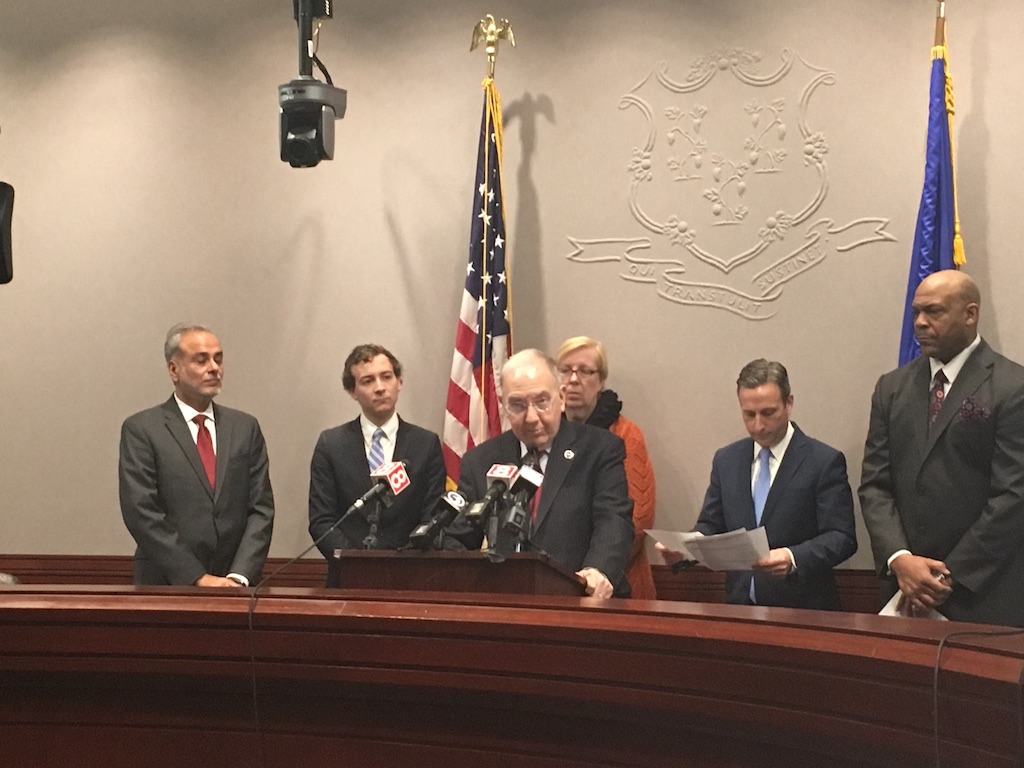At a press conference Thursday, Senate President Pro-Tem Martin Looney, D-New Haven, announced Senate Democrats will push back against municipal zoning restrictions that make it difficult for low-income families to get affordable housing in suburbia.
“Communities should not be able to rely upon local zoning and local practices to the extent that they are right now to bar the development of affordable housing in their community,” Looney said. “It’s an issue where the needs of the state take precedence over needs or wishes of individual towns.”
Looney said the challenge of affordable housing in Connecticut is “an ongoing challenge of conscience.”
Sen. Saud Anwar, D-South Windsor, said that they hope to encourage municipalities to accept more affordable housing development by using a “carrot” as opposed to a “stick” by potentially tying increased state education funding or school building funds to the municipality’s willingness to accept affordable housing.
Although the carrot approach may work for low to middle-income areas that would likely need and accept more state funding, Connecticut’s wealthiest municipalities receive little in the way of state funding and would have little need to accept any bargain from the state.
When questioned about this, Anwar jokingly said, “Well, then we’ll have to use a stick.”
The push by Democrats comes after a series of CT Mirror articles showed how local zoning laws – particularly in Connecticut’s wealthier districts – prevent the building of more affordable housing.
An interesting twist in the story, however, is that some of those towns have elected Democratic senators in the last election, even as their residents protest the building of new housing units meant to help the poor gain upward mobility or have access to good school systems.
Towns like Greenwich, Westport and Wilton elected new Democratic senators over long-time Republican incumbents, and Gov. Ned Lamont is a resident of Greenwich.
Sen. Will Haskell, D-Wilton, stood with his fellow senators at the press conference. Haskell’s district includes parts of Westport, which was singled out for scrutiny in articles by Jacqueline Rabe Thomas, a reporter for CT Mirror, over the town’s repeated push back against affordable housing development.
It is unknown what “stick,” if any, could be used to curb zoning restrictions for towns that are financially powerful enough to operate with hardly any help from the state.
There already exist federal laws against exclusionary zoning practices. Connecticut has a state affordable housing law that allows developers to bypass zoning laws if at least 30 percent of the proposed units are affordable housing, but towns can obtain temporary waivers.
Critics say real estate developers use the laws to gain ample state funding through tax credits and state bonds for building projects, with millions borrowed and little progress to show for it.
This is not the first time that a rift could develop between the Democrat legislative majority and some of its newer members from traditionally wealthy districts.
During the 2019 legislative session, Looney proposed forcing school districts to regionalize, sparking ample protest from residents in areas like Westport and Wilton forcing newly elected senators Haskell and Alexandra Bergstein, D-Greenwich, to dissent from party leadership.
Lamont, who was initially supportive of forced school consolidation, eventually backtracked, and a bill to establish a commission to study school regionalization was never brought up for a vote.
Senate Democrats also announced their intention to pursue cannabis legalization, more mental health services for children and higher education students and making financial literacy classes a requirement in public schools.


John Feher
January 26, 2020 @ 3:47 pm
Here the state telling the towns what to do when the state can t even get there act together. How Pathedic.Sad we,left Ct but glad we did
Linda Lavelle
January 28, 2020 @ 5:50 pm
There are plenty of small, affordable houses in nearly every town as fed-up-with-high-taxes residents move to fiscally responsible states. Zoning laws were passed to protect the value of a homeowner’s house, so someone who worked hard and saved up to buy a house they could afford wouldn’t later have its worth and desirability destroyed by the arrival of a multi-story apartment building right next door. The Supreme Court has ruled that property rights include the right to enjoy one’s property. Obviously Mr. Looney, like many of his Democrat colleagues, have no use for property rights in their determination to reorganize society to their liking. So we can watch as CT’s historic charming towns, many of them in rural areas, will now have multifamily hi rise apartments filled with folks who will now be stranded without public transportation and job opportunities. Everyone loses. Good job, Democrats.
William derosa
March 22, 2021 @ 9:27 am
What everybody seeMs to have missed is ct is just following the National Democrat party. Back when Obama was PresIdent this very topic was on the front burner. When Trump came into office he cancelled it. Ct is not a leader in anything except highest taxes in Union. Lamont followed Cuomos covid policies with the eldery and 74% oF deaths in ct were Attributed to thEse horrible ill conceived plans. Ct was #1 in GDP some 35 yrs ago today It is #48, thaNKs to the Dem stranglehold on Ct government. PerHaps the most alarming thought of all is that the very people charged with decision making and running Ct government are comPletely UNQUALIFIED in doing so. ThEse positions pay 28k Per year as a REPRESENTATIVE or State Senator in ct. local ReAl estate sales assOciates or drivers Education instructors in real life making complicated decisions that decide the fate of this state….. Hartford has no business controlling zoning in local towns. Most everybody knows this but party loyalty wins out over common SenSe.